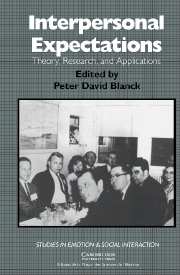Book contents
- Frontmatter
- Contents
- Preface
- List of contributors
- Introduction
- Part I Research on interpersonal expectations
- Part II Research on the mediation of interpersonal expectations through nonverbal behavior
- 11 The spontaneous communication of interpersonal expectations
- 12 The accurate perception of nonverbal behavior: Questions of theory and research design
- 13 Nonverbal communication of expectancy effects: Can we communicate high expectations if only we try?
- 14 Gender, nonverbal behavior, and expectations
- 15 Expectations in the physician-patient relationship: Implications for patient adherence to medical treatment recommendations
- 16 Comment: Interpersonal expectations, social influence, and emotion transfer
- Part III The study of interpersonal expectations
- Author index
- Subject index
- Studies in Emotion and Social Interaction
15 - Expectations in the physician-patient relationship: Implications for patient adherence to medical treatment recommendations
from Part II - Research on the mediation of interpersonal expectations through nonverbal behavior
Published online by Cambridge University Press: 23 December 2009
- Frontmatter
- Contents
- Preface
- List of contributors
- Introduction
- Part I Research on interpersonal expectations
- Part II Research on the mediation of interpersonal expectations through nonverbal behavior
- 11 The spontaneous communication of interpersonal expectations
- 12 The accurate perception of nonverbal behavior: Questions of theory and research design
- 13 Nonverbal communication of expectancy effects: Can we communicate high expectations if only we try?
- 14 Gender, nonverbal behavior, and expectations
- 15 Expectations in the physician-patient relationship: Implications for patient adherence to medical treatment recommendations
- 16 Comment: Interpersonal expectations, social influence, and emotion transfer
- Part III The study of interpersonal expectations
- Author index
- Subject index
- Studies in Emotion and Social Interaction
Summary
Prior to the mid-twentieth century, the important effects of physicians' expectations for their patients were recognized and accepted, and seemed to require little empirical study. As early as the fourth century B.C., Hippocrates noted: ‘The patient, though conscious that his condition is perilous, may recover his health simply through his contentment with the goodness of the physician” (Hippocrates, fourth century B.C., 1923 translation). The proliferation of modern medical techniques in the past five decades, however, has been so impressive that demonstration of the contribution of interpersonal factors in medical care has become imperative.
Milmoe, Rosenthal, Blane, Chafety, and Wolf (1967) demonstrated that despite modern medicine (in this case, an effective method for treating alcoholism), a patient's willingness to take advantage of the opportunity to control the disease depended, in large part, upon the emotional expressions of the doctor. Their study found that the degree of hostility expressed by a doctor's voice tone while talking about alcoholic patients was highly correlated with the doctor's failure to get patients into treatment. This demonstration of the role of affect in the physician-patient relationship and Bob Rosenthal's enthusiasm for quantitatively analyzing therapeutic communication have inspired decades of research on physician-patient relationships and communication.
The two physician-patient interactions that follow may help to illustrate how a physician's interpersonal behavior toward and expectations for a patient can be communicated. These powerful messages can affect patients' understanding of what they must do to care for themselves, as well as their willingness and sense of competence to take positive health actions.
- Type
- Chapter
- Information
- Interpersonal ExpectationsTheory, Research and Applications, pp. 296 - 315Publisher: Cambridge University PressPrint publication year: 1993
- 7
- Cited by



